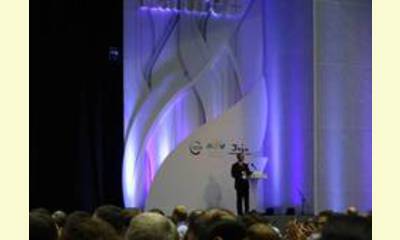|
|
Cities High on the Agenda at Major Conservation Gathering
un article par ICLEI news (abridged)
From 6-15 September, over 10,000 delegates from
153 countries participated in the World
Conservation Congress (WCC) on Jeju Island,
Republic of Korea. The quadrennial Congress
constitutes the premier gathering of organizations
and experts affiliated to the International Union
for Conservation of Nature (IUCN), the world’s
oldest and largest environmental organization.
IUCN comprises more than 1200 government and NGO
members, including ICLEI, and almost 11000
volunteer experts.

click on photo to enlarge
Throughout hundreds of events, with the
overarching slogan, Nature+, participants explored
and promoted nature-based solutions to the world’s
most pressing economic and social challenges,
affording special attention to the themes,
governance, development, food, and climate.
Congress highlights included updates on IUCN’s Red
List of Ecosystems and Green List of Protected
Areas, the launch of a publication documenting the
world’s 100 most endangered species, the Protected
Planet Report, the unveiling of a new EU fund of
20 million Euros earmarked for protected areas
management, and the announcement by several large
corporations of innovative initiatives and
partnerships for nature conservation.
ICLEI partnered in several workshops, including
WCC Session 790, Urban Dimensions of Nature
Conservation and WCC Session 141, Collaborating
with Local and Sub-national Authorities to achieve
the Aichi Targets. The former examined the
characteristics of urban protected areas and the
unconventional conservation strategies they
necessitate. The latter explored opportunities for
sub-national authorities to become more actively
engaged in nature conservation. . .
In the IUCN Members’ Assembly, a unique global
environmental parliament, NGOs and governments
debated and voted on over 180 motions. Motions
addressing Atlantic bluefin tuna stocks, rare
dolphin species, illegal bear farms, offsore
drilling in South America, payment for ecosystem
services, elephant and rhino poaching, mercury
contamination, law enforcement, and recreational
diving were adopted, as were two important motions
relating to local governments: Motion 006 on
Cooperation with local and regional government
authorities in the implementation of the IUCN
Programme 2013–2016; and Motion 058 on Redesigning
future cities and related urban zones with
protected areas: cities, return to nature. . .
|








|
DISCUSSION
Question(s) liée(s) à cet article:
Despite the vested interests of companies and governments, Can we make progress toward sustainable development?
* * * * *
Commentaire le plus récent:
[responding to CPNN article The film 'Demain', a manifesto?
Yes initiatives from the grassroots are important and necessary which will have a direct impact on the present and the future. But there are governments like India which are conscious of over exploitation of the earth’s resources and are taking suitable policy measures and also taking legal action against the exploiters.
We must emphasize public transportation and reduce our dependence on individual cars even though the auto industry will not like this.
Otherwise it is not demain but aujourdhui — the problems are there for us to see.

|
|









